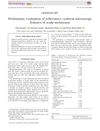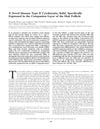 7 citations,
July 2017 in “Australasian Journal of Dermatology”
7 citations,
July 2017 in “Australasian Journal of Dermatology” Reflectance confocal microscopy is useful for diagnosing scalp melanomas, which have features similar to those on the trunk.
 7 citations,
November 2013 in “Pediatrics in Review”
7 citations,
November 2013 in “Pediatrics in Review” Acne is a chronic skin condition not caused by poor hygiene or diet, and it requires long-term treatment and patient education.
 15 citations,
March 2012 in “International journal of nanomedicine”
15 citations,
March 2012 in “International journal of nanomedicine” Local injections of nanosized rhEPO can speed up skin healing and improve quality after deep second-degree burns.
 11 citations,
March 2008 in “Experimental Dermatology”
11 citations,
March 2008 in “Experimental Dermatology” A substance called compound-1 could help increase hair growth by maintaining prostaglandin levels in hair follicles.
 May 1991 in “Current problems in dermatology”
May 1991 in “Current problems in dermatology” Skin issues can indicate immune system problems.
 October 2017 in “The Indian Journal of Animal Sciences”
October 2017 in “The Indian Journal of Animal Sciences” The prolactin gene polymorphism doesn't affect cashmere quality in these goats.
 October 2024 in “International Journal of Molecular Sciences”
October 2024 in “International Journal of Molecular Sciences” Rosa rugosa extract promotes hair growth and could be a natural treatment for hair loss.
 3 citations,
April 2022 in “Frontiers in Physiology”
3 citations,
April 2022 in “Frontiers in Physiology” Ptch2 plays a key role in controlling stem cell function and the ability to regenerate after birth.
 7 citations,
May 2022 in “PLOS ONE”
7 citations,
May 2022 in “PLOS ONE” Certain genes and pathways are linked to the production of finer and denser wool in Hetian sheep.
 27 citations,
August 2005 in “The journal of investigative dermatology/Journal of investigative dermatology”
27 citations,
August 2005 in “The journal of investigative dermatology/Journal of investigative dermatology” Researchers found new genes involved in hair growth, which could help develop new hair treatments.

A woman successfully sued for not being told about a medication's side effects, emphasizing doctors' duty to inform patients.
 16 citations,
January 2020 in “Diabetes”
16 citations,
January 2020 in “Diabetes” A new therapy sped up wound healing and reduced scarring in diabetic rats.
 26 citations,
February 2020 in “Frontiers in genetics”
26 citations,
February 2020 in “Frontiers in genetics” The CORT, FGF5, and CD36 genes are crucial for the cold weather adaptation of Yanbian cattle.
 54 citations,
November 1998 in “Archives of dermatology”
54 citations,
November 1998 in “Archives of dermatology” Avoiding certain nutrients and drugs may help manage pemphigus.
 108 citations,
July 2002 in “Molecular and cellular biology”
108 citations,
July 2002 in “Molecular and cellular biology” Overexpressing Dsg3 in mice skin causes excessive cell growth and abnormal skin development.
 March 2024 in “Frontiers in genetics”
March 2024 in “Frontiers in genetics” Xiangdong black goats have moderate genetic diversity, minimal inbreeding, and important genes for reproduction, immunity, and other traits.

Ganoderma lucidum extract may help treat stress-related hair loss.
 47 citations,
June 2019 in “Nature Communications”
47 citations,
June 2019 in “Nature Communications” Noncoding dsRNA boosts hair growth by activating TLR3 and increasing retinoic acid.
 17 citations,
May 2018 in “PeerJ”
17 citations,
May 2018 in “PeerJ” VB-1, a natural compound, may promote hair growth by enhancing a key cell growth pathway.
 107 citations,
August 2002 in “Journal of Neurology, Neurosurgery, and Psychiatry”
107 citations,
August 2002 in “Journal of Neurology, Neurosurgery, and Psychiatry” Women with epilepsy should be monitored for reproductive issues, which can be caused by epilepsy or its treatments, especially when using valproate.
 139 citations,
December 1998 in “The journal of investigative dermatology/Journal of investigative dermatology”
139 citations,
December 1998 in “The journal of investigative dermatology/Journal of investigative dermatology” K6hf is a unique protein found only in a specific layer of hair follicles.
49 citations,
July 2000 in “Journal of Histochemistry & Cytochemistry” POMC-derived peptides are important for skin functions like immune response and stress management.
1 citations,
February 2023 in “Animals” November 2023 in “Biomolecules” The research showed that Vitamin D and its receptor are important for healthy bones and normal hair and skin in rats.
 55 citations,
March 2015 in “Carcinogenesis”
55 citations,
March 2015 in “Carcinogenesis” WNT10A helps esophageal cancer cells spread and keep renewing themselves.
 December 1988 in “Journal of The American Academy of Dermatology”
December 1988 in “Journal of The American Academy of Dermatology” The meeting covered new findings in children's skin conditions and treatments, including the benefits of super absorbent polymer diapers.
 June 2017 in “Experimental and Therapeutic Medicine”
June 2017 in “Experimental and Therapeutic Medicine” The anti-CXCL4 antibody helps mice grow hair faster and prevents hair loss.
 18 citations,
February 2022 in “Cell Death Discovery”
18 citations,
February 2022 in “Cell Death Discovery” ECM1-modified stem cells can effectively treat liver cirrhosis.
 19 citations,
April 2015 in “European Journal of Pharmacology”
19 citations,
April 2015 in “European Journal of Pharmacology” Dihydrotestosterone (DHT) doesn't affect rat skin cell growth, but it does change cell cycle, protein levels, and other cell functions, potentially shortening hair growth cycle.
 6 citations,
May 2014 in “Biomarkers and Genomic Medicine”
6 citations,
May 2014 in “Biomarkers and Genomic Medicine” Charnoly bodies could be a marker for cell damage, and certain nutrients and proteins might prevent them, potentially helping with brain diseases and cancer.



























